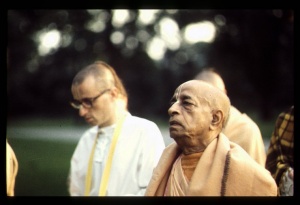SB 11.17.10

A.C. Bhaktivedanta Swami Prabhupada
Please note: The synonyms, translation and purport of this verse were composed by disciples of Śrīla Prabhupāda
TEXT 10
- ādau kṛta-yuge varṇo
- nṛṇāṁ haṁsa iti smṛtaḥ
- kṛta-kṛtyāḥ prajā jātyā
- tasmāt kṛta-yugaṁ viduḥ
SYNONYMS
ādau — in the beginning (of the millennium); kṛta-yuge — in the Satya-yuga, or age of truth; varṇaḥ — the social class; nṛṇām — of human beings; haṁsaḥ — named haṁsa; iti — thus; smṛtaḥ — well known; kṛta-kṛtyāḥ — perfect in the execution of duties by complete surrender to the Supreme Lord; prajāḥ — the citizens; jātyā — automatically by birth; tasmāt — therefore; kṛta-yugam — Kṛta-yuga, or the age in which all duties are fulfilled; viduḥ — was thus known by the learned.
Translation and purport composed by disciples of Śrīla Prabhupāda
TRANSLATION
In the beginning, in Satya-yuga, there is only one social class, called haṁsa, to which all human beings belong. In that age all people are unalloyed devotees of the Lord from birth, and thus learned scholars call this first age Kṛta-yuga, or the age in which all religious duties are perfectly fulfilled.
PURPORT
It is understood from this verse that the supreme religious principle is unalloyed surrender to the Supreme Personality of Godhead. In Satya-yuga there is no influence of the lower modes of nature, and therefore all human beings belong to the highest social order, called haṁsa, in which one comes under the direct supervision of the Personality of Godhead. In the modern age people are crying out for social equality, but unless all human beings are situated in the mode of goodness, which is the position of purity and unalloyed devotion, social equality is not possible. As the lower modes of nature become prominent, secondary religious principles arise, by which people may be gradually elevated to the pure stage of unalloyed surrender to God. In Satya-yuga there are no inferior human beings, and thus there is no need of secondary religious principles. Everyone directly takes to the unalloyed service of the Lord, fulfilling perfectly all religious obligations. In Sanskrit, one who perfectly executes all duties is called kṛta-kṛtya, as mentioned in this verse. Therefore Satya-yuga is called Kṛta-yuga, or the age of perfect religious action. According to Śrīla Jīva Gosvāmī, the word ādau ("in the beginning") refers to the moment of universal creation. In other words, the varṇāśrama system is not a recent concoction but naturally arises at the time of creation and should therefore be accepted by all intelligent human beings.